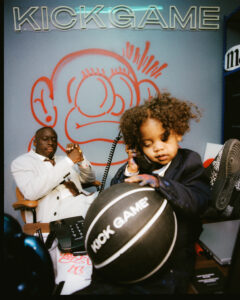Disclaimer: G HerbO doesn’t fit the themE of this issue at all. He made the cut because Viper’s editor is a super fan. But just in case you haven’t jumped on the Chicago rapper’s wave yet, here’s her pitch for why he’s the next rapper to change the game.
It’s true, I’m a G Herbo Stan. But I’m not alone. The Chi Town native has been consistent year after year, bringing him equal to peers like Chief Keef and Lil Durk who exploded onto the scene in the early 2010’s. We connect on FaceTime for an interview while he’s deep into his ‘Ballin Like I’m Kobe’ tour. Once the call connects, he expresses shock at my international phone number, telling a member of his entourage in the background, “She has 12 fucking digits.”
In between hype club tunes, G Herbo’s songs detail the sadness and pressure that comes with growing up in Chicago. An effortless storyteller, G Herbo’s way with words belies his twenty years on the planet. Listening to him, you question how someone so young has gone through so much without losing his sanity, yet you understand the voice behind the stories is significantly older than his years. Speaking on his hometown, he says, “Certain situations are important. You might be in a situation where your life or freedom is on the line, that’s really just growing up in Chicago.
Despite being part of Chicago’s drill scene G Herbo’s songs have incredibly conscious lyrics. He slides fast paced bars over a heavy baseline to subliminally sling wisdom to listeners drawn to the energy, neglecting to notice the knowledge shining through his words. Like many great Midwestern rappers that have come before him, G Herbo has a tendency to slip into a double-time speed when rapping. He enjoys changing flow mid-song, or even mid-verse, just to keep listeners guessing. “I might turn the fans up, then go slow for a whole verse then switch it up, they be like, ‘Damn’. Or I might go slow for the first verse then go fast for the next eight bars or the next four bars to tease ‘em.”
G Herbo started rapping at a young age, “I was probably 10 writing my own shit,” thanks to his uncle who was already a part of Chicago’s music scene. This led to an early influence on the style he still raps with today, “My uncle K Tone who passed away, that’s how I fell in love with music. He had a relationship with Twista and Do Or Die so I would look up to [them] so that’s why I rap [double-time].” He details impromptu studio sessions in his early teenage years, “My uncle had a MOTIF and it would be me, him, his sons and my other cousin and we’d be fucking around. We was young, like 13, making beats on the MOTIF, just rapping, making shit.”
Later, his friendship with fellow Chicago rapper, Lil Bibby, saw him experiment further with the double-time flow, although he reveals an interesting reason why. “When I first started rapping I was double-time ‘cause I never knew how to make hooks, Bibby was always the person that would make the hooks and I would just rap for two or three minutes so I would like to change my flow up. I don’t even try to do it, sometimes when I listen to a beat, that’s just how it come out, the style just depends on how I’m feeling.”
G Herbo has a great ear for soulful beats, with many of the tracks on his mixtapes full of high-emotion samples. Speaking on this he says, “That’s why I don’t label my music as drill music ‘cause it’s soulful and I like to rap about the shit I’ve seen in my life. When I hear those beats with the struggle and pain on it it reminds me of what I’ve really been through, so I don’t have to think of too many punchlines ‘cause I’m really writing about my life and making it rhyme. I’m really writing about my life so I don’t have to think too hard. It compliments me, the soulful shit. When I hear it, I can relate to it. I get the soulful shit in my body and it comes to me, I instantly know what I’m about to start rapping about. As soon as I hear it, I know what the song’s gon’ be about.”
A great example of this is the stunning ‘100 Days 100 Nights’ on ‘Ballin Like I’m Kobe’, a song that he admits is one of his favourites on the project. He continues, “a lot of shit on my tape will put chills through my body ‘cause it’s really me telling the truth about my life and how I’ve grown since I first began rapping.” His approach to documenting life in Terror Town, Chicago, is reminiscent of Nas’ writing style on ‘Illmatic’ but there’s another iconic NYC rapper that G Herbo is even more reminiscent of; DMX. Their husky tones are similar, but it’s the way the pair display their emotions with no shame that connects them. ‘100 Days 100 Nights’ sees him speak directly to his best friend Kobe, who G Herbo was with hours before he was shot and killed, “Say Kobe, without you in these streets feel like I’m lost, my nigga / Shed so many tears, make me feel weak, but nah, I ain’t soft my nigga.” The emotion shared on G Herbo’s tracks is what stands out. Regardless of whether you can relate to the situations he’s survived, it speaks to you. It seems like what hip hop has been lacking since the days DMX was baring his soul on wax.
Even before ‘Ballin Like I’m Kobe’, I saw similarities between him and DMX, so I ask if it’s something G Herbo gets a lot. He smiles, expressing gratitude that anyone would compare him to one of the greatest MCs, “If someone was to compare me to DMX then I’d take that as a big compliment because DMX was a real hard lyricist who changed the game.” We discuss the Yonkers legend’s role in changing the landscape of rap and how he made it more acceptable for men in rap to express their emotions, “Exactly, and being yourself, he wasn’t afraid to be himself.”
Neither is G Herbo. On ‘Mamma I’m Sorry’ on ‘Welcome To Fazoland’, he details coming home to his mother one night after his friend’s been killed, “I remember, comin’ in / Middle of the night, my eyes red / You asked me why and I ain’t wanna tell you / Cause my guy’s dead.” That lyric alone is heartbreaking, but it’s one of many as he recounts many tales of losing friends throughout childhood. It’s refreshing to hear a rapper speak honestly on the pain and emotion that comes with the violent life many artists would rather glorify. I ask if G Herbo’s ever seen music as a form of therapy and he agrees it can be, “Really my music is a form of therapy ‘cause people come to me all the time like, ‘I relate to your shit, your shit gets me by’. I do this shit for people who [are] in the struggle and who [have] been though what I’ve been through. It’s motivational music, I’m really just talking about my life and it really just lets people know and paints a picture that anything is possible. I didn’t start rapping to become a big superstar, I was just having fun.”
G Herbo remains very emotionally connected to his music and reports on the negative experiences in his East Side Chicago community with intelligence. He never glorifies the violence in his community, likewise he never preaches as if he wasn’t out in the streets too. What’s impressive is how he can share his personal experiences with his peers and even those older than him without ever judging or criticising. “Everything I’ve been through made me who I am so I’m not afraid of life changes, because everything I’ve been through made me stronger and I always learn from my mistakes. I know that you go through things in your life that’s gon’ make you, that’s why I move the way I move and speak on the stuff that I speak on in my music.” Part of his ability to speak to people of all ages comes from the life he’s lived and the experiences usually reserved for a man much older than 20. “I know I’ve lived the life of a grown man and that’s why I tell the stories I tell. When you talk to [someone] who’s 30 and you tell them you’re 20, they think you have the mind of a 20 year old but I don’t. I’ve been through things already that 30 year olds go through and I live my life and act mature really by force, not even a choice. I really had to mature on my own.”
Despite the glamour and glory of Chicago, much of the media’s attention on the city in recent years relates to the high rates of violence that eventually led to the nickname, “Chiraq.” As G Herbo explains “In Chicago and being from the streets, the youth only wanna be three things, a drug dealer, a rapper or a basketball player. Even growing up, my father always told me, you’re going to college. He always drilled that into me and I wanted to play basketball so I never had a problem with going to college. But when my basketball dreams didn’t really work out, I never wanted to get a job, a nine to five or work for anybody. I don’t know if it was me seeing what was going on around me or if it was never in me to go and work a job or nothing like that. I feel like where you come from, the people look at those things to help them get out, they don’t really look at the honest route.”
G Herbo grew up on 79th and Essex, an area he calls Roc Block, in the East Side Chicago community that even the police call “Terror Town.” I point out that it doesn’t sound like a place with many local prospects for someone growing up there. G Herbo agrees, “it’s a place like if you ain’t from there, you shouldn’t really come there. That whole Terror Town thing that’s way before my time, we didn’t name it that. I’m only 20 and that shit been Terror Town for 30, 40 years probably. We’ve seen a lot growing up over there and we’ve been through a lot. We had to learn to survive and adapt to our environment growing up. You gotta be smart if you gon’ be in the streets, it’s not what you do but how you do it. In the streets there’s only one or two maybe three outcomes; you make it out, you go to jail or you end up being killed. So you gotta make those right decisions cus you gotta know what you getting yourself into. Even at a young age, I knew what I was getting myself into. I knew the game I was playing was not a kid game, it was a grown man game. I could lose my life so I just had to be smart and make the right decisions. I wouldn’t say I know everything, but I know the ins and outs of the streets and what’s going on. I wouldn’t encourage anybody to be in the streets or go through what I went through. But if you going to go through that, just do it right. That’s the message I try [to] deliver.”
This is an extract from the Spring Summer 16 Issue of Viper Magazine. Read more from the magazine here. Buy physical and digital copies here.
Photos by Bryan Allen Lamb
Words by Lily Mercer




